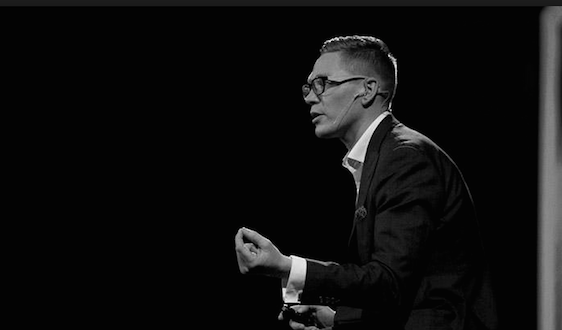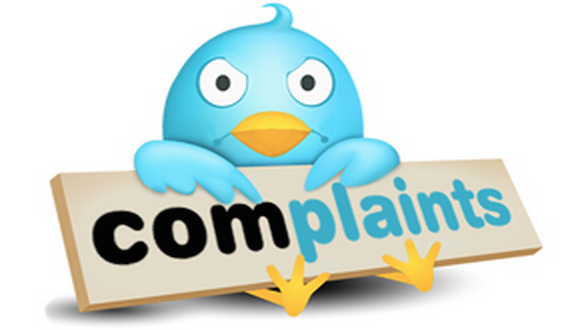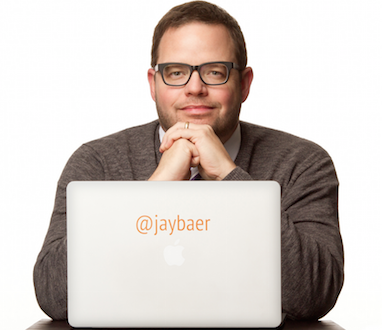In this Google hangout, Jay Baer - founder of Convince and Convert , marketing keynote speaker and best selling author chats with Anders Sorman-Nilsson - founder of Thinque, futurist and keynote speaker discussing marketing in this digital age and how to deal with complaints generated by social media.
We would like thank Jay for joining us at Thinque for our first interview in the "Hangouts On Air" series. If you would like to see more on Jay or connect, click here to visit Jay's website at Convince and Convert, or here to purchase one of Jay's many books.
Full transcript of Video below:
Jay: The social business index, which is 1:100-point scale of how "good" a company is in social media. There is quite a correlation between those two lists. It was pretty staggering, actually, that companies who are really good at social media are also good places to work - in terms of how their employees rate them as employers and vice versa.
Now, again, I can't prove causation there, but it was a very interesting finding, I thought.
Anders: One of my thoughts around that, then . . . and it'll be real interesting over the next few years, I think, as social media goes to being more established and becoming traditional media to really study that correlation between trust amongst employees, confidence to speak out, engagement scores, etc and look at how that translates into their social media awareness. But one of the things that's been striking me a little bit is whether this term of "social media" hasn't really done this space that you and I feature in so heavily. A little bit of a disservice, given that many C-level people don't take it as seriously as maybe they should.
Jay: No question. I think that's a very wise point. In fact, you may know the marketing consultant and author, David Meerman Scott his work, he's out there a lot has a number of bestselling books. He has this rule that he never uses the words "social media" with an executive. He refuses to use those words, because all it does is make them think of pictures of cats and weird Snapchat things. It just doesn't do any favors.
He always talks about, "What does social media get you?" Well, greater customer engagement, business intelligence, competitive analysis, interaction with prospects. All the kind of things that social media can do. His advice is, "Only talk about those things and never use the word 'social media'" because it carries so much baggage." While I haven't been able to necessarily follow in those footsteps, per se, I think it's a very interesting point.
Anders: Fantastic. So just for those guys tuning in here on live Google Hangouts On Air, this is Anders Sörman-Nilsson, futurist, hanging out in Stockholm, Sweden, at the home office today AdThink, talking to the social media and social engagement guru, Jay Baer, who I've made the acquaintance with about a year ago at the simple@work Xerox conference together with our good friend Hillary Clinton who we so elaborately say "opened up" to the conference for me and Jay.

Anders Sorman-Nilsson, founder of Thinque and Author of "Digilogue: how to win the digital minds and analogue hearts of tomorrow's customer"
We're talking social media here. We're talking Utility, Jay Baer's latest book. But also, we're starting to touch upon some of the complaints that are being generated and how maybe to turn those into advantages for companies, brand strategists and marketers.
I'm curious about this. Because if social media has been touted as a risky area among CEOs; it's been there, so the conversation might happen, or someone could talk us about behind our back if we engage in social media. But I'm curious to see if we take that to the next logic step here, if you are engaging or not engaging, you want to be part of the conversation. How do you see the future of complaints emerging and what are the opportunities in that, Jay?

Jay: We just finished a big research project around this topic in preparation for my new book. What we find, which is probably not surprising, is that social media in mobile and smartphones create more complaints. It is so much easier to just grab your phone and say, "I don't like this," than it is to call or e-mail or write a letter or visit in person or any of the other ways that we have complained for a thousand years. So technology and social media makes it easier to express your displeasure.
What we find in the research is that companies are doing a relatively good job addressing direct complaints. So if somebody says on e-mail or via phone or a very direct, "I have a real problem with this. This is broken, please fix it," etc. Where companies don't do a very good job is in what we would consider to be the indirect complaints. Things like a tweet or on Facebook that talks about the brand and says, "I don't really like this company or this product," but doesn't actually ask for a help. It's just an expressing of displeasure. Brands don't do a very good job of addressing that.
They also don't do a particularly good job of addressing commentary in places like discussion boards, forums, TripAdvisor, Yelp!, sites like that. Which are not owned real estate of the company themselves. You have a company Facebook page. You don't really have a company TripAdvisor page in the same sense. So what we find is that how companies address complaints varies a lot by channel. But the real opportunity for companies, actually, is in that second batch, the indirect complaints. What we find in the research is that consumers might say something on TripAdvisor and be like, "This hotel sucks," or whatever. They don't really expect a company to respond. But when a company does respond, it actually changes the way they think about that company 30% to 40% on a net promoter score scale. It has a huge impact on what they believe about that company.
So the new book and this whole field of research is all around how do you build brand trust and brand value by completely defying customer expectations? We think about complaints as a bad thing. Like, "Oh, no, somebody doesn't like us. They're complaining." What we're finding is that one of the best things you can do for your company is to have people complain. Because it gives you an opportunity to then flip the script on them and respond in a way that they weren't expecting. It really is an opportunity to build brand value and most businesses, of course, don't think of it that way.
Anders: It's a really interesting space. Of course, it reminds me of some of the deepest client relationships we have, I think, with our clients. That I certainly have as a futurist and as a speaker. But also, some of the associated clients that we deal with.
Oftentimes, we come back to this idea that, "Hey, something might have actually gone wrong. But we fixed it." And "We fixed it," actually builds deeper glue than if we'd have this merry, perfect honeymoon story from the beginning. Because showing up when times are maybe a little bit tougher tends to build that glue even closer with your clients.
Jay: Yeah. Bad news can become good news really quickly if you handle it appropriately.
Anders: So any kind of practical examples of companies that are doing this particularly well at the moment, or what are you seeing? Who's engaging in this space and taking a really. . . ?

Jay Baer, founder of Convince and Convert
Jay: I have a personal example from two days ago, actually. The company that handles my health insurance, and of course, in the U.S., health insurance is a whole different world. We've got individual private companies that handle that, so I have a company that provides my insurance. They have, I don't know, a few hundred thousand customers, 500,000 customers or something.
Their information technology stack was hacked. All of their customers' information was taken by hackers. So name, address, Social Security number, everything. They didn't get access to credit card numbers, fortunately or medical condition history, also good news. But it's still a lot of information.
But within an hour of this being discovered, they already had a special website put together. They had an interactive FAQ put together. I got a personal e-mail from the CEO. They had a full-page ad in the newspaper the next day explaining what wrong. They handled it as well as you could possibly handle something like that in terms of the speed of response, the depth of explanation, the instructions about what to do next. It was really social media crisis 101 and they did an unbelievable job.
You don't typically, at least I don't typically, think of a large healthcare company being that nimble, being that fast and just really having that kind of empathy for customers. It was really quite impressive; I'm going to write a blog post about it and document the story. Because, I'm not happy, put it that way. But I could have been so much less happy had they handled this differently, and it was pretty remarkable.
Anders: That's a really interesting piece because, particularly, hacks have been something that companies have been very, very resistant towards actually even communicating that they have occurred. So the fact that they do it within an hour and that they set up this support network is, I find, really, really impressive.
I'm curious, how much did your net promoter score jump in that couple of hours, Jay?
Jay: I don't know. It's a great question. I guess I would probably say that my net promoter score stayed . . . well, okay. On one hand, you don't think, "Wow, let me really recommend this company, because I did just get hacked." But you know what? I have never, ever, ever, ever even talked about this company publicly in my whole life until right now on your show. So maybe, my net promoter score did actually go up, right? Which is pretty amazing, right? I just lived my own principle. I was probably a 6 before on a 0 to 9 scale because I was like, "I have insurance, yay." I didn't really care one way or the other, but now I'm actually going out of my way to tell people. So yeah, I guess now, I went from a 6 to an 8.
Anders: And kind of highlights the importance of companies or brands also making sure they know who's their customer? Because if you've got influencers and brand advocates and people with an audience like you or me, very quickly, this, again, through social media, through Google Hangouts, through Twitter, etc., can make pretty decent and pretty big news.
Have you got any horror stories?
Jay: Oh well, sure. There's horror stories every day of companies having some sort of a misstep and then not handling it. The example that I use in almost every speech, and it's actually from my first book, The Now Revolution, so this example is now five years old.
There is a hotel in Arizona, it's near where I used to live. There's a review of this hotel on TripAdvisor.com that is probably the most negative review I've ever read. The person speculates that several people were murdered in the room. That they might catch HIV from the bed. It's really bad, really, really bad. And that review has never been answered. It's now five years and it's still there on TripAdvisor. You think, "Okay, I'm pretty sure that hotel has never, ever booked another room night on TripAdvisor since that time." Because there's no way as a traveler you'd be like, "I'm going to overlook that review. I'm just going to chalk that up to somebody who was having a bad day. It's way too bad."
My suspicion is that that is a small hotel, family-owned. They probably don't even know TripAdvisor exists, right? But meanwhile, they've had all of their brand value leaking out the bottom of this bucket for five years. That kind of thing happens all the time.
Even today, while companies, I think, are doing a pretty good job, as I mentioned, with addressing direct complaints, our research shows that in the U.S., still, something like 60% of complaints on Twitter go unanswered, are never answered at all, 60%. It's better than it used to be when it was 72% a couple years ago were unanswered, but still, it's not like everybody who complains is getting handled.
Anders: Yeah, absolutely. I mean, in my experience, too, I find that Twitter is definitely not the most efficient. I mean, I find that still I have to go through, particularly last year, I spent 241 days traveling around the world just like you. I have a few airline complaints, but they generally go unanswered. They generally go unanswered when it's via Twitter or Facebook. They do respond very slowly when you go via their official e-mail address, their customer complaints line. But that seems to be the way things go.
Jay: You know what's funny? Go ahead.
Anders: Yeah, you can go.
Jay: I was just saying that it's funny about airlines. I fly a lot, too. I didn't do 240, I did about 180 days last year, which is plenty for me. But people are always complaining about airlines, right? Especially business travelers.
So I did a little study on my own Facebook page last year. I just asked my own friends, whatever a couple thousand people, I said "Hey, tell me, what is your favorite airline? Then tell me what is your least favorite airline?" I was just curious, right? It was all U.S. based airlines.
It turned out that just in my group of friends, every single U.S. airline was named as both the best and the worst. What I take away from that is that there are so many points of contact and so many points of failure in the airline business, that your perception of an airline is basically driven by whatever your most recent experience was with that airline. It's impossible for them to do a great job all the time and that's why even airlines that some people think are good, other people think are terrible, because they had a really bad experience in this one moment in time.
It makes me think about, "What a terrible and difficult business that is to be in," from a customer service standpoint. Because even if you're doing everything "well" you're still disappointing thousands of people a day, right? For reasons that may not even be in your control; weather, mechanical, etc. It's just a really, really, really hard business to be in, I think.
Anders: Yeah, exactly. Even if you actually get people from Point A to Point B, which is their job, we're still going to be complaining about it. We were five minutes late, we sat on the tarmac for ten minutes, whatever.
I should add, though, that for someone that travels quite a bit in North America, too, that I probably couldn't list that many good American airlines either. However, there're not that many good European ones either and if I look to the great ones, they tend to be the ones in the Middle East, Asia . . .
Jay: Asia, yeah.
Anders: . . . or Australia and New Zealand.
Jay: Yes.
Anders: Particularly in New Zealand, they've done some really great design work, really looking at the customer touch points and making sure that it's a seamless experience across their touch points and their points of [inaudible 00:17:03].
Jay: That sounds great. Have you written about that?
Anders: Yeah, in New Zealand, I think there's a phenomenal ones. I've blogged about them a few times. They're also a client of mine, so I know some of their thinking that they've put into place and they've done some great work with another think tank, a company called idio in terms of really looking at their customers.
Jay: Oh, sure, I know those guys.
Anders: They've left a heavy footprint across the organization. They keep taking out a lot of customer service awards around the world, which is impressive for a small airline, which is, of course, the official airline of Middle Earth as well. They've [inaudible 00:17:42].
Jay: I've seen some of those videos, they're amazing.
Anders: Yeah, yeah, exactly. Cool. I'm conscious of time here, Jay, as well. But any thoughts on what you're particularly passionate about and what you're obsessing with? Any key social media apps or social media platforms that our viewers should be keeping an eye out for in the next 12 to 24 months?
Jay: Yeah. As I mentioned, really bullish on video. I'm doing a daily video now called Jay Today. Three minutes every day where I just talk about business and social media and life. It's been really effective. A lot of podcasts, as I mentioned. We have three shows now in my organization, we're getting ready to launch four more. So we'll just keep making podcasts.
We actually built a website not long ago called MarketingPodcasts.com, which is actually a Google, basically, a search engine for marketing podcasts and it's really awesome and that thing never existed before. So we built that.
But this idea of social media channels as media distribution outlets is incredibly important for business and is going to be huge by this next time next year. Facebook is absolutely gunning for YouTube. Facebook Video is . . . and is actually bigger than YouTube now in some corners already. They're doing a billion, one billion video plays a day on Facebook and growing very quickly.
So you've got Facebook as essentially a media outlet, as a television channel, if you will. YouTube, of course. Instagram with Instagram Video and now Snapchat with their recent opening of what they call Discover, which is a media outlet for select brands right now. It's ESPN and a few other brands are in there, Vice, etc. Being able to actually create content, distribute content within the Snapchat environment is really interesting.
We have, for a long time, thought about companies and brands creating content and then distributing that content on their own websites, on YouTube, on their own app. Now, we're seeing companies create content and say, "Well, maybe it doesn't need to be on our website at all, because no one is going to come to our website." So we're taking content and pushing it out into the spaces where people are already spending their time, which is social channels.
So the new broadcast networks, the new Sky TV is not TV, right? It's Facebook, it's YouTube, it's Snapchat, it's WhatsApp, it's all those guys. That has pretty serious ramifications for not only marketing, but also, customer service.
Anders: So this is an extreme narrow casting or marketing in the nooks and crannies of the Twittersphere and the Facebook utopia, etc., right?
Jay: Yeah, absolutely. But it is narrow casting, but in some cases, it's not. Because you can reach large, large audiences in some of these spaces. Facebook, in particular, for now. But as more social technology is adopted, there'll be other ways to reach large audiences.
We just had the U.S. Super Bowl recently. You can reach a lot of people now on Facebook or on YouTube. Not as many as a Super Bowl television commercial, but we're starting to see digital, in some cases, as a viable, big-brand initiative. That's pretty fascinating.
Anders: And a huge brand amplifier. Speaking of brand and amplification and where people can find Jay Baer online, I know you have multiple platforms. But which ones should people be checking out, and for those of you who are reading the transcription of this interview, what are the best URLs for people to find you?
Jay: Thanks, my friend. You can find more about me at JayBaer.com, B-A-E-R. You can find all of our content, our award-winning blog, multiple podcasts, daily e-mail, etc., at ConvinceandConvert.com.
Anders: Fantastic, Jay. We'll include that in the show notes for today as well. It's been my pleasure. Anders Sörman-Nilsson here, futurist sitting today in Stockholm, on Monday in Shanghai, hosting my very international friend from over in Indiana today, right, Jay?
Jay: Yes. I am temporarily at home.
Anders: Temporarily at home in the Midwest where I also love to spend time. It's been great to have you on the show, Jay and I look forward to tuning in with you tomorrow. For all the viewers, I really recommend you check out Jay Baer's work, both some of his past books, including Utility which we happily signed at the Xerox conference last year on Wall Street, together during our book signings. Also, your upcoming work on user generator, but also employee-generated content as well as how you turn complaints into huge brand loyalty and net promoter scores.
Jay, pleasure hanging out and look forward to seeing you somewhere around an airport, around the world soon.
Jay: I hope so, see you soon.
Anders: Ciao.

